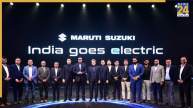India’s Automotive sector has been of pivotal importance to over all growth and development of the country. As of now India’s auto motive sector holds the 3rd place for being the largest Automotive market world over. This transformation of the auto sector to the powerhouse that it is today has been fueled by the everchanging preferences of the customers, the growing need of sustainable and affordable mobility and support from profound government policies.
The governments profound steps to facilitate indigenization of EV product manufacturing helped Indian automotive sector reach a new echelon of growth. Government schemes such as the Production Linked Incentive Scheme for automobiles , FAME2 and the recent PM E-Drive and SMEC have acted like a significant catalyst for the over all growth.
Further Schemes like the Pm E-drive Scheme which aims at electrification of the public transport and bolstering EV infrastructure has crossed about Rs 332 crore. This has helped the nation reach its overall sustainability and EV shift goals significantly.
As per the news reports online the new 2025-26 union Budget would direct finances and overall emphasis towards eco Frinedliness- Innovation and employment generation. Government would pay special attention towards the promotion of manufacturing of EV’s in India. And for the same aim several policies have been initiated these include Auto PLI, PM E-Drive, and a new scheme to promote manufacturing of electric passengers cars. As per the plans these schemes would help the government in attracting investment in the country and also complementing the overall shift towards the EV market.
Auto Sector Expectations From The Union Budget 2025
Domestic market protection with Incentives that curb import reliance.
With thee growing rise of the EV market the import of Lithium Ion Cell poses a threat to the auto sector’s growth. Government would surely incentivize schemes that would allow the budding new battery producers a safeguard against the battle with the lower priced imported batteries. The policies would safeguard the budding market of battery producers to manufacture batteries and help in EV Production in India. The Incentive linked Production scheme has already lead to great results as manufacturers such as Hyundai and Suzuki have already indigenized a bug chunk of their EV battery manufacturing to India. Its possible that the new Budget might increase the custom duty on certain EV components for which the nation provides a conducive environment for production.
EV Infrastructure – Battery Recycling
With the growing needs of the nation, focus should be diverted towards the overall expansion of charging stations as well as battery recycling stations altogether. While the expansion of the EV infrastructure is itself a big task it further leads to the question of how the batteries would be recycling. Significant attention towards the recycling from this point onwards would lead to a wholistic development of the Local EV market.
GST Rebates
The new Union Budget must bring in changes to the inverted duty structure for EV’s in GST. This could be possibly done by bringing necessary changes to the refund process on buying a EV and beyond that GST rate rationalization for the Hybrid vehicles that could help the nation in reaching a smooth transition towards green mobility. All of the above mentioned changes can be introduced to solidify India’s position as a leader in the EV shift world over.
Also Read: 2024 Budget Proposals For Automotive Sector – How They Impacted The Auto Industry?













